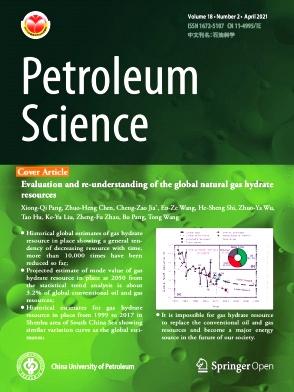Extraction of reflected waves from acoustic logging data using variation mode decomposition and curvelet transform
IF 6
1区 工程技术
Q2 ENERGY & FUELS
引用次数: 0
Abstract
Remote reflection waves, essential for acquiring high-resolution images of geological structures beyond boreholes, often suffer contamination from strong direct mode waves propagating along the borehole. Consequently, the extraction of weak reflected waves becomes pivotal for optimizing migration image quality. This paper introduces a novel approach to extracting reflected waves by sequentially operating in the spatial frequency and curvelet domains. Using variation mode decomposition (VMD), single-channel spatial domain signals within the common offset gather are iteratively decomposed into high-wavenumber and low-wavenumber intrinsic mode functions (IMFs). The low-wavenumber IMF is then subtracted from the overall waveform to attenuate direct mode waves. Subsequently, the curvelet transform is employed to segregate upgoing and downgoing reflected waves within the filtered curvelet domain. As a result, direct mode waves are substantially suppressed, while the integrity of reflected waves is fully preserved. The efficacy of this approach is validated through processing synthetic and field data, underscoring its potential as a robust extraction technique.
利用变模分解和小曲线变换从声波测井数据中提取反射波
远程反射波对于获取钻孔外地质结构的高分辨率图像至关重要,但往往会受到沿钻孔传播的强直模波的污染。因此,提取弱反射波对于优化迁移图像质量至关重要。本文介绍了一种通过在空间频率域和小曲线域顺序操作来提取反射波的新方法。利用变模分解(VMD)技术,将共同偏移集合内的单通道空间域信号迭代分解为高波数和低波数本征模态函数(IMF)。然后从整体波形中减去低波长 IMF,以衰减直模波。随后,采用小曲线变换在滤波小曲线域内分离上行和下行反射波。因此,直模波被大大抑制,而反射波的完整性则得到了完全保留。通过处理合成数据和现场数据,验证了这一方法的有效性,凸显了其作为一种稳健提取技术的潜力。
本文章由计算机程序翻译,如有差异,请以英文原文为准。
求助全文
约1分钟内获得全文
求助全文
来源期刊

Petroleum Science
地学-地球化学与地球物理
CiteScore
7.70
自引率
16.10%
发文量
311
审稿时长
63 days
期刊介绍:
Petroleum Science is the only English journal in China on petroleum science and technology that is intended for professionals engaged in petroleum science research and technical applications all over the world, as well as the managerial personnel of oil companies. It covers petroleum geology, petroleum geophysics, petroleum engineering, petrochemistry & chemical engineering, petroleum mechanics, and economic management. It aims to introduce the latest results in oil industry research in China, promote cooperation in petroleum science research between China and the rest of the world, and build a bridge for scientific communication between China and the world.
 求助内容:
求助内容: 应助结果提醒方式:
应助结果提醒方式:


